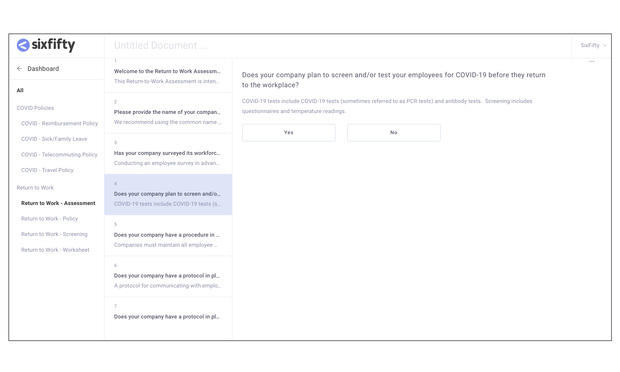Can Firm Tech Help Corporate Legal Bring Employees Back to the Office?
Corporate legal may be more comfortable dealing with flesh and blood attorneys than technology, but as COVID-19 restrictions ease, the rush to prepare for employees' return to the office may favor the speed and cost-effectiveness of a tech assist.
May 15, 2020 at 03:07 PM
4 minute read
The original version of this story was published on Legal Tech News
 The assessment included in SixFifty's new legal toolset designed to help companies transition employees back into the workplace.
The assessment included in SixFifty's new legal toolset designed to help companies transition employees back into the workplace.
As states across the country begin easing COVID-19 social distancing restrictions, companies are faced with the challenge of engineering a safe and legally defensible framework for transitioning employees back into the office environment. But due to the extraordinary nature of the pandemic, corporate legal departments may find themselves pivoting further in the direction of technology instead of outside attorneys as they look for rapid-fire guidance through uncharted territory.
At least that's what the folks over at SixFifty—law firm Wilson Sonsini Goodrich & Rosati's tech subsidiary—were banking on this week as they rolled out a Return to Work Toolset, an automated platform that helps companies determine which employees can safely reenter the workplace. The solution also solicits employer responses to a series of questions around items such as the existence of corporate COVID-19 screening and testing plans to help businesses. The answers are then used to automatically generate relevant policies and guidelines.
Kimball Parker, CEO of SixFifty, believes that products such as the Return to Work Toolset will be in high demand, pointing to a feeling among companies that are "lost" at how to begin guiding workers back into offices. "If an employer doesn't take reasonable steps to prevent COVID-19 from spreading through a workplace, they can be subject to serious liability, company-ending liability," he said.
To be sure, Wilson Sonsini isn't the only law firm attempting to address that need through tech. Earlier this week, McDermott Will & Emery launched an ongoing webinar series navigating various return-to-work topics that will be continually updated Tuesdays and Thursdays. Meanwhile, Ogletree, Deakins, Nash, Smoak & Stewart added a Return to Work Guide to its online COVID-19 Resource Center, which includes analysis on various state employer guidelines as the emerge from state to state.
But with flesh and blood attorneys only a phone call away, will corporate legal departments feel comfortable relying on technology—automated or otherwise—to help them chart a legally defensible path forward? Zach Abramowitz, a consultant in the legal technology space, admitted that legal departments are generally nervous about using "something that's not people."
In evaluating a product like SixFifty's Return to Work Toolset, companies would have to weigh the potential time and cost savings against the potential for legal risk should something go wrong. "I definitely think the [chief financial officer] of any organization would look at a tool like this as a win but the legal department is there to be cautious," Abramowitz said.
But there may be some factors unique to COVID-19 that could ultimately tip the scales in favor of SixFifty and other legal tech providers looking to craft return to work solutions. Parker at SixFifty argued that while lawyers have legal advice or policy templates in place for dealing with longstanding workplace issues such as sexual harassment, responding to a pandemic could necessitate a more ground-up approach—which likely translates to higher legal bills.
Given the fluidity of the COVID-19 crisis thus far, sudden changes—such as an update in the Centers for Disease Control and Prevention guidelines, for example—could render some very expensive legal advice suddenly obsolete. But a tech platform can be updated constantly.
"This is a situation where I don't see how you could do it without a technology assist," Parker said.
Still, will that be enough to sway corporate legal departments? Abramowitz pointed out that both law firm tech subsidiaries and stand-alone tech startups alike all struggle to walk clients past the fear of legal risk. But in the case of return-to-work solutions, he thinks that law firm-associated products may have an edge given the standing reputations for legal expertise those institutions typically enjoy.
In the case of corporate legal departments, Abramowitz posited that tech is already being successfully deployed to deal with a variety of COVID-19 related problems. "I think that there have been some huge wins for companies that have already made investments in technology and I think over the course of the next year we'll probably start hearing some of those trickle out," he said.
This content has been archived. It is available through our partners, LexisNexis® and Bloomberg Law.
To view this content, please continue to their sites.
Not a Lexis Subscriber?
Subscribe Now
Not a Bloomberg Law Subscriber?
Subscribe Now
NOT FOR REPRINT
© 2025 ALM Global, LLC, All Rights Reserved. Request academic re-use from www.copyright.com. All other uses, submit a request to [email protected]. For more information visit Asset & Logo Licensing.
You Might Like
View All
Landlord Must Pay Prevailing Tenants' $21K Attorney Fees in Commercial Lease Dispute, Appellate Court Rules
4 minute read
State Appellate Court Settles Fee Battle Between Former Co-Counsel in Patent Litigation
5 minute read
Return to Work Mandates Among Current Mental Health Stressors for Legal Professionals
1 minute read
Internal GC Hires Rebounded in '24, but Companies Still Drawn to Outside Candidates
4 minute readLaw Firms Mentioned
Trending Stories
- 1'Translate Across Disciplines': Paul Hastings’ New Tech Transactions Leader
- 2Milbank’s Revenue and Profits Surge Following Demand Increases Across the Board
- 3Fourth Quarter Growth in Demand and Worked Rates Coincided with Countercyclical Dip, New Report Indicates
- 4Public Notices/Calendars
- 5Monday Newspaper
Who Got The Work
J. Brugh Lower of Gibbons has entered an appearance for industrial equipment supplier Devco Corporation in a pending trademark infringement lawsuit. The suit, accusing the defendant of selling knock-off Graco products, was filed Dec. 18 in New Jersey District Court by Rivkin Radler on behalf of Graco Inc. and Graco Minnesota. The case, assigned to U.S. District Judge Zahid N. Quraishi, is 3:24-cv-11294, Graco Inc. et al v. Devco Corporation.
Who Got The Work
Rebecca Maller-Stein and Kent A. Yalowitz of Arnold & Porter Kaye Scholer have entered their appearances for Hanaco Venture Capital and its executives, Lior Prosor and David Frankel, in a pending securities lawsuit. The action, filed on Dec. 24 in New York Southern District Court by Zell, Aron & Co. on behalf of Goldeneye Advisors, accuses the defendants of negligently and fraudulently managing the plaintiff's $1 million investment. The case, assigned to U.S. District Judge Vernon S. Broderick, is 1:24-cv-09918, Goldeneye Advisors, LLC v. Hanaco Venture Capital, Ltd. et al.
Who Got The Work
Attorneys from A&O Shearman has stepped in as defense counsel for Toronto-Dominion Bank and other defendants in a pending securities class action. The suit, filed Dec. 11 in New York Southern District Court by Bleichmar Fonti & Auld, accuses the defendants of concealing the bank's 'pervasive' deficiencies in regards to its compliance with the Bank Secrecy Act and the quality of its anti-money laundering controls. The case, assigned to U.S. District Judge Arun Subramanian, is 1:24-cv-09445, Gonzalez v. The Toronto-Dominion Bank et al.
Who Got The Work
Crown Castle International, a Pennsylvania company providing shared communications infrastructure, has turned to Luke D. Wolf of Gordon Rees Scully Mansukhani to fend off a pending breach-of-contract lawsuit. The court action, filed Nov. 25 in Michigan Eastern District Court by Hooper Hathaway PC on behalf of The Town Residences LLC, accuses Crown Castle of failing to transfer approximately $30,000 in utility payments from T-Mobile in breach of a roof-top lease and assignment agreement. The case, assigned to U.S. District Judge Susan K. Declercq, is 2:24-cv-13131, The Town Residences LLC v. T-Mobile US, Inc. et al.
Who Got The Work
Wilfred P. Coronato and Daniel M. Schwartz of McCarter & English have stepped in as defense counsel to Electrolux Home Products Inc. in a pending product liability lawsuit. The court action, filed Nov. 26 in New York Eastern District Court by Poulos Lopiccolo PC and Nagel Rice LLP on behalf of David Stern, alleges that the defendant's refrigerators’ drawers and shelving repeatedly break and fall apart within months after purchase. The case, assigned to U.S. District Judge Joan M. Azrack, is 2:24-cv-08204, Stern v. Electrolux Home Products, Inc.
Featured Firms
Law Offices of Gary Martin Hays & Associates, P.C.
(470) 294-1674
Law Offices of Mark E. Salomone
(857) 444-6468
Smith & Hassler
(713) 739-1250








